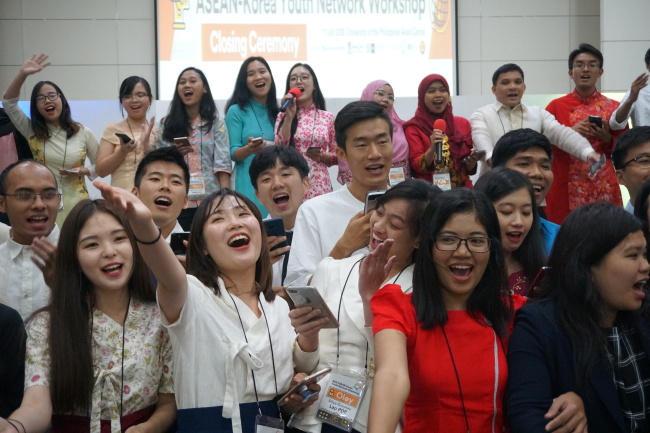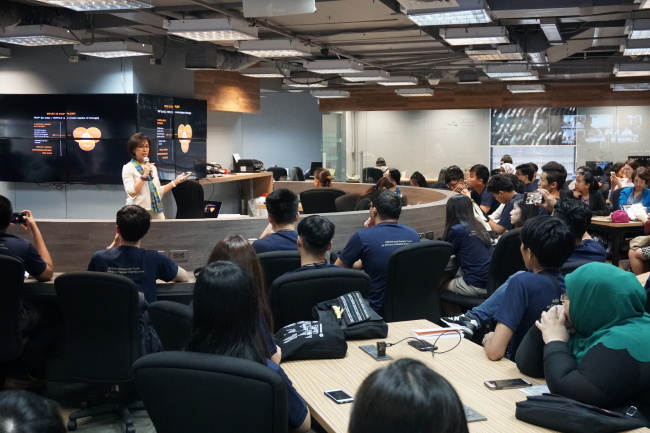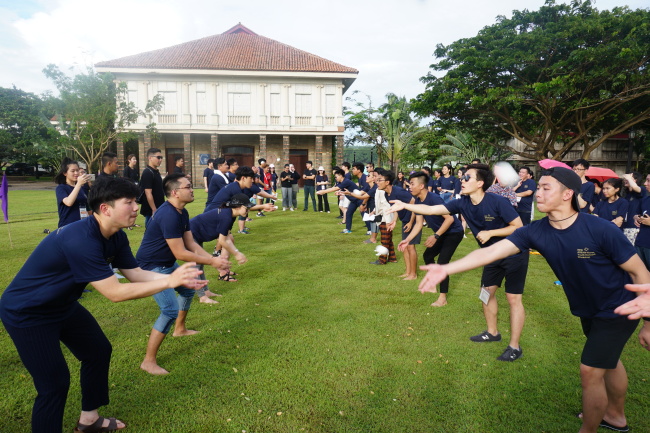ASEAN students strive to become drivers of global digitalization
70 students learn the implications of digitalization in ASEAN-Korea Centre youth workshop
By Jo He-rimPublished : Aug. 12, 2018 - 16:47
MANILA, Philippines -- Digitalization and information communications technology have become indispensable in everyday life. From serious traffic congestions to establishing a city administration program, digitalization plays a key part, drawing out more convenient ways to get things done.
To gain insight to the different implications of digitalization, some 70 youths from South Korea, Japan, China and 10 ASEAN countries participated in the 2018 ASEAN-Korea Youth Network Workshop organized by ASEAN Korea-Centre from July 2 to 11.
To gain insight to the different implications of digitalization, some 70 youths from South Korea, Japan, China and 10 ASEAN countries participated in the 2018 ASEAN-Korea Youth Network Workshop organized by ASEAN Korea-Centre from July 2 to 11.

The participants traveled to the capital cities of Korea and the Philippines to visit different sites and witness how digitalization is being applied to influence the daily lives of the people.
In the second part of their workshop, which was held in Manila from July 7 to 11, the students experienced the fast-changing digitalization trend of the Philippines, a country which is seeing its people spending some of the longest hours online.
“Digitalization, according to United Nations Children’s Fund, helps young generation on the move find a safe route and connect with their families. Greater online connectivity has opened new avenues for civic engagement, social inclusion and other opportunities,” Joefe Santarita, the Dean of the Asian Center at University of the Philippines, which co-organized the event said in his welcoming speech.
The students of the ASEAN and East Asian countries attended lectures given by field experts and met with entrepreneurs and policymakers during their 10-day workshop.
At QBO Innovation Hub and Google, the Program Associate for Startup Development Adria Villarroya gave an insight into different types of entrepreneurship and how digitalization plays a role in innovating business models.
The participants also had the chance to peek into the field of fin-tech, meeting with Acudeen, a fin-tech company that partners with SMEs and streamlines their payment system.

During a visit to Rappler, a social news network that operates in Philippines and Indonesia, the students were able to grasp the idea of the values in operating an online media outlet.
“Civic engagement happens when news turns into a conversation with the community,” Raisa Serafica, the unit head of Civic Engagement of Rappler said, giving examples of their popular coverage using social media and videos.
With an economic growth rate of 6 percent for the past couple of years, the Philippines has been seeing steady increase in its smartphone penetration rate. While about 40 percent of the population of 100 million have a mobile phone, it is forecast to reach 80 percent by 2021, according to an Ericsson analysis report on South East Asia and Oceania published in March 2016.
The Philippines also ranked second in the time spent per day on the internet, with an average of nine hours and 29 minutes, an annual report of an English Social Marketing Agency “We are Social” showed. Filipino users spend an average of four hours on social media services such as Facebook, another finding showed.
Bich Ngoc Nguyen, a Vietnamese graduate student studying at University of Seoul was interested to see how the startup companies managed their work and play a role in the developing country.
“From what we saw and learned, we would be able to introduce and make use of the strategies the startup companies have shown us in our countries,” she told The Korea Herald.
From the meeting with the Korean Ambassador to the Philippines Han Dong-man, the students were able to get a detailed, overall introduction to the country and its relations with South Korea -- from their cooperation in 2013 when Typhoon Yolanda hit the southeastern part of the country to its security and business issues.

“From the workshop, we the ASEAN and Korean youths were challenged to be the drivers of productive, constructive, engaging and empowering digitalization in this global and connected world,” Muhammad Afi Ramadhan, a student participant from Indonesia said.
On the last day of the workshop, the students divided into 10 groups to give policy proposals to resolve problems the societies of 10 ASEAN countries face, such as traffic congestion in the Philippines and Indonesia’s harmful haze.
The government of the Philippines is striving to resolve its serious traffic problem with a $180 billion “Build-Build-Build” project to build more subways, highways and other infrastructure.
Pointing to the time it takes for construction to reach completion, one group presented the idea of digitalizing jeepneys -- minibuses that provide the Philippines’ most popular form of transportation -- by installing GPS trackers on them to create new, more efficient routes and destinations for their more routine operations.
The group said it got its idea from Seoul’s bus system.
Taking different policy strategies and technology, other groups also presented digital proposals for various tasks -- from clearing the harmful haze in Indonesia to providing e-learning facilities and birth registration programs.
By Jo He-rim (herim@heraldcorp.com)








![[Graphic News] More Koreans say they plan long-distance trips this year](http://res.heraldm.com/phpwas/restmb_idxmake.php?idx=644&simg=/content/image/2024/04/17/20240417050828_0.gif&u=)
![[KH Explains] Hyundai's full hybrid edge to pay off amid slow transition to pure EVs](http://res.heraldm.com/phpwas/restmb_idxmake.php?idx=644&simg=/content/image/2024/04/18/20240418050645_0.jpg&u=20240419100350)






![[From the Scene] Monks, Buddhists hail return of remains of Buddhas](http://res.heraldm.com/phpwas/restmb_idxmake.php?idx=652&simg=/content/image/2024/04/19/20240419050617_0.jpg&u=20240419175937)

![[KH Explains] Hyundai's full hybrid edge to pay off amid slow transition to pure EVs](http://res.heraldm.com/phpwas/restmb_idxmake.php?idx=652&simg=/content/image/2024/04/18/20240418050645_0.jpg&u=20240419100350)

![[Today’s K-pop] Illit drops debut single remix](http://res.heraldm.com/phpwas/restmb_idxmake.php?idx=642&simg=/content/image/2024/04/19/20240419050612_0.jpg&u=)